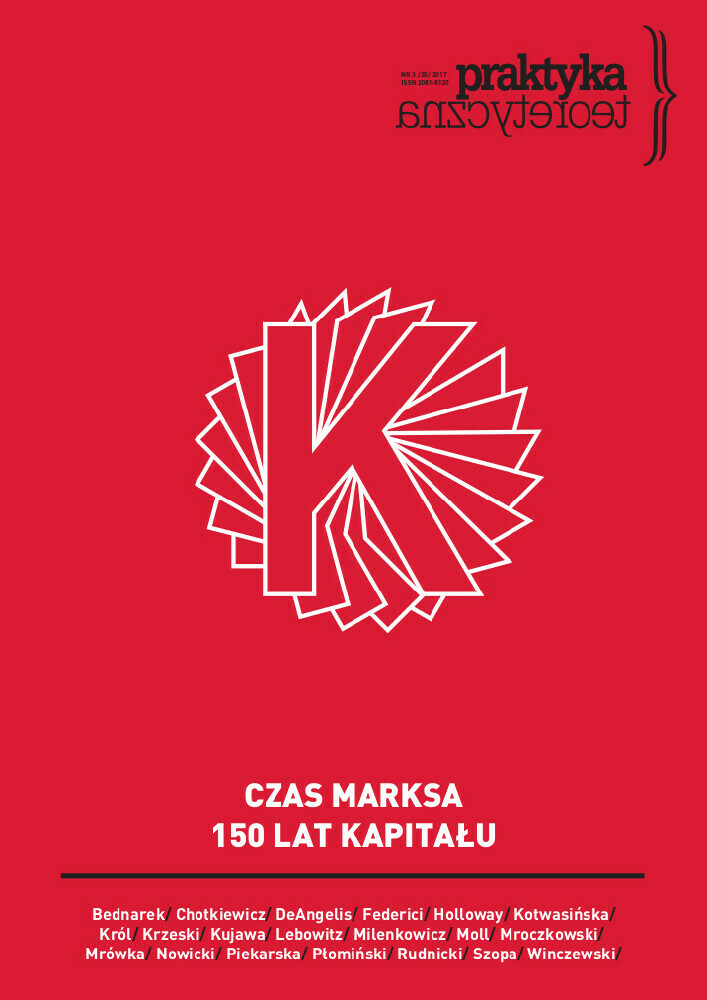Abstract
This article is in fact a translation of chapter 5 of Massimo De Angelis’ Omnia Sunt Communia. On the Commons and the Transformation to Postcapitalism. Inspired by the formulas of circulation, the author undertakes an examination of the co-dependency relationship between capital and the commons. In the end he presents a general formula of the commons and, at the same time, the hidden side of the C-M-C and M-C-M formulas, which hitherto had been overlooked, even by Marx.References
Aoki, Masato. 2001. „To the Rescue or to the Abyss: Notes on the Marx in Keynes.” Journal of Economic Issues 35(4): 931–54.
Arystoteles. 2008. Polityka. Tłum. Ludwik Piotrowicz. Warszawa: PWN.
Bell, Peter i Harry Cleaver. 2017. Teoria kryzysu jako teoria walki klas. Tłum. Krzysztof Król. Poznań: Wydawnictwo A+.
Barbagallo, Camille. 2016. The Political Economy of Reproduction: Motherhood, Work and the Home in Neoliberal Britain. PhD thesis: University of East London.
Cox, Nicole i Silvia Federici. 1976. Counter-planning from the Kitchen: Wages for Housework: A Perspective on Capital and the Left. New York: New York Wages for Housework Committee.
Dalla Costa, Mariarosa i Selma James. 1975. The Power of Women and the Subversion of the Community. Bristol: Falling Wall Press.
Cleaver, Harry. 2011. Polityczne czytanie Kapitału. Tłum. Iwo Czyż. Poznań: Oficyna Wydawnicza Bractwa Trojka.
Damasio, Antonio. 2005. W poszukiwaniu Spinozy. Radość, smutek i czujący mózg. Tłum. Janusz Szczepański. Poznań: Rebis.
De Angelis, Massimo. 2004. „Separating the Doing and the Deed: Capital and the Continuous Character of Enclosures”. Historical Materialism, 12(2): 57–87.
De Angelis, Massimo. 2007. The Beginning of History: Value Struggles and Global Capital. London: Pluto.
Deb, Debal. 2009. Beyond Developmentality: Constructing Inclusive Freedom and Sustainability. London: Earthscan.
Dillard, Dudley. 1984. „Keynes and Marx: A Centennial Appraisal.” Journal of Post Keynesian Economics 6(3): 421–432.
Dillard, Dudley. 1987. „Money as an Institution of Capitalism.” Journal of Economic Issues 21(4): 1623–1647.
Dyer-Witheford, Nick. 2006. The Circulation of the Common. Paper presented at Immaterial Labour, Multitudes and New Social Subjects: Class Composition in Cognitive Capitalism, 29–30 April, King’s College, University of Cambridge. www.fims.uwo.ca/people/faculty/dyerwitheford/commons2006.pdf.
Garrett, Roberta, Tracy Jensen i Angie Voela (red.). 2016. We Need to Talk about Family: Essays on Neoliberalism, the Family and Popular Culture. Cambridge: Cambridge Scholars Publishing.
Hardt, Michael i Antonio Negri. 2004. Multitude: War and Democracy in the Age of Empire. New York: Penguin.
Hardt, Michael i Antonio Negri. 2012. Rzecz-pospolita. Poza własność prywatną i dobro publiczne. Tłum. Piotr Juskowiak, Agnieszka Kowalczyk, Mikołaj Ratajczak, Krystian Szadkowski, Maciej Szlinder. Kraków: Korporacja Ha!art.
Harvey, David. 2003. The New Imperialism. Oxford: Oxford University Press.
Harvie, David i Keir Milburn. 2004. Moments of Excess. Leeds: Free Association.
Luhmann, Niklas. 2007. Systemy społeczne. Tłum. Michał Kaczmarczyk. Kraków: Nomos.
Marks, Karol. 1951. Kapitał, t. 1. Warszawa: Książka i Wiedza.
Meadows, Donella. H. 2008. Thinking in Systems. London: Earthscan.
Midnight Notes Collective. 1992. „New Enclosures.” W Midnight Notes, przedruk w The Commoner 2, September 2001, www.commoner.org.uk/02midnight.pdf.
Mudu, Pierpaolo. 2004. „Resisting and Challenging Neoliberalism: Development of Italian Social Centers.” Antipode 36 (5): 917–941.
Okia, Opolot. 2012. Communal Labour in Colonial Kenya: The Legitimisation of Coercion. New York: Palgrave Macmillan.
P2P Foundation. 2010. Section 2, Stefan Meretz. Commons – Typology, http://p2pfoundation.net/ Commons_-_Typology.
UNHR (2013). Unpaid Work, Poverty and Women’s Human Rights, www.ohchr.org/EN/Issues/Poverty/Pages/UnpaidWork.aspx.
License
“Theoretical Practice” seeks to put into practice the idea of open access to knowledge and broadening the domain of the commons. It serves the development of science, thinking and critical reflection. The journal is published in open-access mode under the CC-BY-NC-SA 4.0 license (detail available here: http://creativecommons.org/licenses/by-nc-sa/4.0/). Articles published in the journal may be freely distributed, stored, printed and utilized for academic and teaching purposes without restrictions.
They should not be, however, used for any commercial purposes or be reconstructed into derivative creations. Access to the journal may not be limited or offered for a fee by any third party.
Prospective authors are obliged to fill in, sign and send back the publishing contract compliant with the CC licencing. [PL.pdf, PL.doc, EN.pdf,EN.doc].
According to this contract, authors grant the journal a non-exclusive right to publish their work under the creative commons license (CC-BY-NC-SA 4.0) without any financial obligation on both sides of the contract.
Before submission authors should make sure that derivative materials they use are not protected by copyright preventing their non-commercial publication. Authors are responsible for any respective copyright violations.
